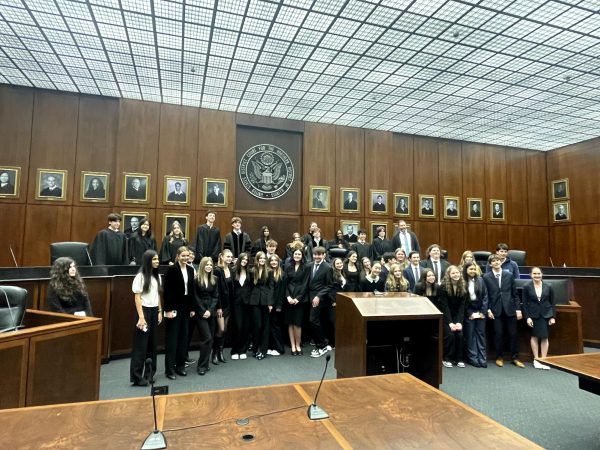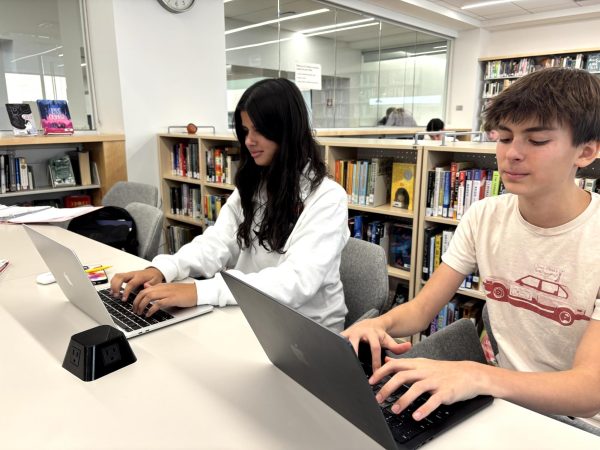Students stepped into the quiet area looking for a silent retreat from the chaos of the Learning Commons. There, sophomores worked, deep in concentration, their backpacks overflowing and spilling onto the tables. The keys on their laptops rattled as fingers frantically typed, feet anxiously tapping on the carpeted floor. Students taking Nazi Mind apprehensively prepared for the December 8 trial that determined not only their semester grade, but if nearly four months of non-stop reading, writing, and preparing would pay off.
The Nazi Mind Nuremberg Trial Simulation took place at the Dirksen Courthouse. The class divides students into prosecutors, defenders, and justices, who then prepare in various ways, such as writing briefs or motions.
The class was first created by Director of Academic Initiatives and Upper School History teacher Ingrid Dorer Fitzpatrick in 1978. “The students I had were juniors, and they were taking an American History elective, but doing something related to history and psychology was very interesting to them,” Ms. Dorer said. “The students invested a ton of time and energy in that first class, which was super exciting.”
Nearly five decades later, Nazi Mind is still offered to sophomores and remains one of the most renowned classes at Latin.

In the last two weeks leading up to the Nazi Mind Nuremberg Trial Simulation, students taking the course had been finalizing their preparations for the trial. Sophomore Tova Ben-Yoseph was a prosecutor in the trial. “The most challenging part for me was getting all my briefs done,” Tova said. “That was hard for me because I’m not very good at managing my time.”
Sophomore Oscar Bubel had the role of lead prosecutor, which takes a more overarching position rather than prosecuting one person specifically. “I’m on motion [on behalf] of all [prosecutors], which means I have to write why the trial should happen,” Oscar said. Prosecutors read his motion, which was 14 pages long.
Balancing the work between writing briefs and motions for Nazi Mind along with homework for other classes proved particularly challenging for many. Sophomore Jonah Kaufman estimated that he spent over 24 hours preparing all of his briefs.
Having taught the course for the past seven years, Upper School history teacher Matt June understands the demands on students. He believes students prepare far more for the Nazi Mind final than for other history courses that he teaches, yet he would equate a majority of the grueling workload to the students’ own ambition. “They often end up doing more in terms of research and of writing,” he said.
“The thing that makes this class unique is that it is always their choice.” The high stakes of the trial are often a motivator for students to go the extra mile in terms of preparation. “It ends up that I’m often telling students to go get some rest and stop working,” Dr. June said.
The pinnacle of student work approaches two weeks before the trial. Dr. June traditionally names the week of November 25-28, two weeks before the trial, “hell week.”
“I call it that because that’s the week before all of the attorneys and the defendants have their materials due,” Dr. June said. “That means writing, finishing, and editing their briefs or motions.” Additionally, Nazi Mind attorneys create an ebook that can be up to 200 pages long.

The actual workload isn’t the only challenging aspect of the course. “Honestly, I feel like these last two weeks have been ‘hell week[s]’ because one of the biggest challenges has been the mental part,” Tova said. “I finished my briefs, but when I looked back and read them, I [was] doubting myself.”
During “hell week,” good time management skills were crucial for many students. “I worked non-stop during [Thanksgiving] weekend to get it done, so it definitely was a weekend of hell,” Oscar said.
In addition to the heavy workload, the oral aspect during the trial can be a stressor for many students. “I have to speak [second] out of everybody,” Oscar said, “So I have to set a good tone for the whole [trial].”
For sophomore Sofy Munive, the anxiety around speaking impacted her performance in class. “I got physically ill reading my opening statement, so I ran to the bathroom to throw up,” Sofy said. “I think [I was] just so nervous.”
As many students were drowning themselves with work, Dr. June offered reminders to take a step back. “Dr. June said ‘you look green, you need some sleep, and you need food,’” Sofy said.
Others anticipated the trial with more excitement to show their progress during the first semester. Prior to the trial, Jonah said, “I wouldn’t say I’m nervous. I’m super excited to present all of my hard work.”
Many students also looked forward to the trial because of the unique location. “It’s really cool that we get to go to an actual courthouse,” Oscar said.
Beyond visiting a real courthouse, the payoff of the class is what makes the trial so exciting and makes the semester worth it for many. “It is a class that you get as much out of as you put into it,” Dr. June said.
Jonah said he would absolutely recommend the class to freshmen. “It was a lot of work, but I loved learning about World War II.”
Others acknowledged that the class may not be for everyone. “Be honest with yourself,” Oscar said. “If you don’t think you can keep up with the workload, that’s okay, but if you feel confident that you can 100% commit to it, I’d definitely do it.”
Nazi Mind serves as a reminder of what hard work can do for the community. “We can do really big things as a class and come together to make a really amazing project,” Tova said the week leading up to the trial. “It shows how dedicated we can be. We’ve had 50 days to do this, and we were able to come together and now we have the trial this week. It’s phenomenal.”



















































